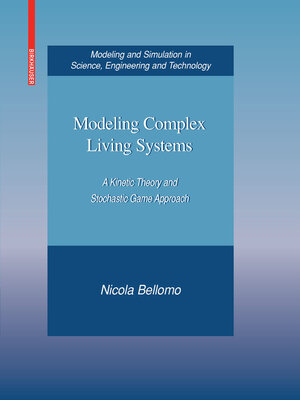Modeling Complex Living Systems
ebook ∣ A Kinetic Theory and Stochastic Game Approach · Modeling and Simulation in Science, Engineering and Technology
By Nicola Bellomo

Sign up to save your library
With an OverDrive account, you can save your favorite libraries for at-a-glance information about availability. Find out more about OverDrive accounts.
Find this title in Libby, the library reading app by OverDrive.



Search for a digital library with this title
Title found at these libraries:
| Library Name | Distance |
|---|---|
| Loading... |
Thesubjectofthisbookisthemodelingofcomplex systemsinthelife sciences constituted by a large number of interacting entities called active particles. Their physical state includes, in addition to geometrical and mechanical variables, a variable called the activity, which characterizes the speci?c living system to be modeled. Interactions among particles not only modify the microscopic state, but may generate proliferative and/or destructive phenomena. The aim of the book is to develop mathematical methods and tools, even a new mathematics, for the modeling of living systems. The background idea is that the modeling of living systems requires technically complex mathematical methods, which may be s- stantially di?erent from those used to deal with inert matter. The?rstpart ofthe bookdiscussesmethodological issues, namely the derivation of various general mathematical frameworks suitable to model particular systems of interest in the applied sciences. The second part presents the various models and applications. The mathematical approach used in the book is based on mathema- cal kinetic theoryfor active particles, whichleads tothederivation of evo- tion equations for a one-particle distribution function over the microscopic state. Two types of equations, to be regarded as a general mathematical framework for deriving the models, are derived corresponding to short and long range interactions.







